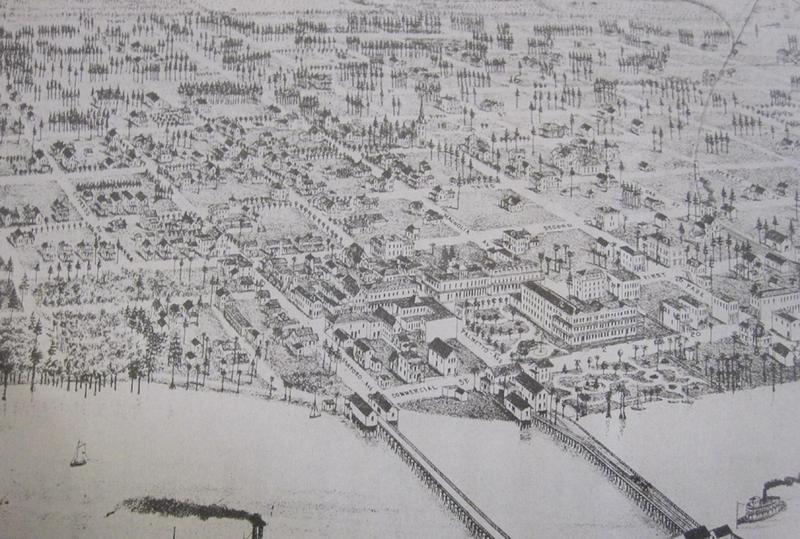City of Sanford Before the Great Fire of 1887
Dublin Core
Title
City of Sanford Before the Great Fire of 1887
Alternative Title
Sanford Before the Great Fire
Subject
Sanford (Fla.)
Waterfront Districts
Lakes & ponds
Lake Monroe (Seminole County and Volusia County, Fla.)
Steamboats--Florida--St. Johns River
Description
The City of Sanford riverfront in the 1880s, just before the Great Fire of 1887. The present-day Sanford, Florida, area was originally inhabited by the Mayaca and Joroco tribes by the time Europeans arrived. The tribe was decimated by war and disease by 1760 and was replaced by the Seminole tribe.
In 1821, the United States acquired Florida from Spain and Americans began to settled in the state. Camp Monroe was established in the mid-1830s to defend the area against Seminoles during the Seminole Wars. Following an attack on February 8, 1837, the camp was renamed Fort Mellon in honor of the battle's only American casualty, Captain Charles Mellon. The Town of Mellonville was founded nearby in 1842 by Daniel Stewart. When Florida became a state three years later, Mellonville became the county seat for Orange County, which was originally a portion of Mosquito County. Citrus was the first cash crop in the area and the first fruit packing plant was constructed in 1869.
In 1870, Henry Shelton Sanford purchased over 12,000 acres of land west of Mellonville to form the community of Sanford. which he called "The Gateway City to South Florida." Sanford was incorporated in 1877 and absorbed Mellonville in 1883. The Great Fire of 1887 devastated the city, which also suffered from a statewide epidemic of yellow fever the following year. The citrus industry flourished until the Great Freezes of 1894 and 1895, causing planters to begin growing celery in 1896 as an alternative. Celery replaced citrus as the city's cash crop and Sanford was nicknamed "The Celery City." In 1913, Sanford became the county seat of Seminole County, once part of Orange County. Agriculture dominated the region until Walt Disney World opened in October of 1971, effectively shifting the Central Florida economy towards tourism and residential development. In 2003, Sanford began the redevelopment of the waterfront with the RiverWalk Project to revitalize the city's riverfront.
In 1821, the United States acquired Florida from Spain and Americans began to settled in the state. Camp Monroe was established in the mid-1830s to defend the area against Seminoles during the Seminole Wars. Following an attack on February 8, 1837, the camp was renamed Fort Mellon in honor of the battle's only American casualty, Captain Charles Mellon. The Town of Mellonville was founded nearby in 1842 by Daniel Stewart. When Florida became a state three years later, Mellonville became the county seat for Orange County, which was originally a portion of Mosquito County. Citrus was the first cash crop in the area and the first fruit packing plant was constructed in 1869.
In 1870, Henry Shelton Sanford purchased over 12,000 acres of land west of Mellonville to form the community of Sanford. which he called "The Gateway City to South Florida." Sanford was incorporated in 1877 and absorbed Mellonville in 1883. The Great Fire of 1887 devastated the city, which also suffered from a statewide epidemic of yellow fever the following year. The citrus industry flourished until the Great Freezes of 1894 and 1895, causing planters to begin growing celery in 1896 as an alternative. Celery replaced citrus as the city's cash crop and Sanford was nicknamed "The Celery City." In 1913, Sanford became the county seat of Seminole County, once part of Orange County. Agriculture dominated the region until Walt Disney World opened in October of 1971, effectively shifting the Central Florida economy towards tourism and residential development. In 2003, Sanford began the redevelopment of the waterfront with the RiverWalk Project to revitalize the city's riverfront.
Abstract
A drawing of the city of Sanford, prior to the Great Fire of 1887.
Source
Original black and white drawing: Sanford Museum, Sanford, Florida.
Publisher
The Seminole Herald
Date Created
ca. 1880-1887
Date Copyrighted
2002
Is Format Of
Digital reproduction of original black and white drawing.
Is Part Of
Sanford Museum, Sanford, Florida.
Sanford Riverfront Collection, Sanford Collection, Seminole County Collection, RICHES of Central Florida.
Is Referenced By
The Seminole Herald. Sanford: Our First 125 Years. [Sanford, FL]: The Herald, 2002, page 2.
Format
image/jpg
Extent
1.14MB
Medium
1 black and white drawing
Language
eng
Type
Still Image
Coverage
Sanford, Florida
Accrual Method
Donation
Mediator
History Teacher
Geography Teacher
Provenance
Originally published by The Seminole Herald.
Rights Holder
Copyright to this resource is held by the Sanford Museum and is provided here by RICHES of Central Florida for educational purposes only.
Curator
Cepero, Laura
Digital Collection
Source Repository
External Reference
The Seminole Herald. Sanford: Our First 125 Years. [Sanford, FL]: The Herald, 2002.
Sanford Historical Society (Fla.). Sanford. Charleston, SC: Arcadia, 2003.
"Sanford: A Brief History." City of Sanford. http://www.sanfordfl.gov/index.aspx?page=48.
Transcript
SANFORD AVE
COMMERCIAL ST
PALMETTO AVE
MAGNOLIA AVE
SECOND
COMMERCIAL ST
PALMETTO AVE
MAGNOLIA AVE
SECOND
Still Image Item Type Metadata
Original Format
1 black and white drawing
Collection
Citation
“City of Sanford Before the Great Fire of 1887,” RICHES, accessed February 15, 2026, https://richesmi.cah.ucf.edu/omeka/items/show/2182.
